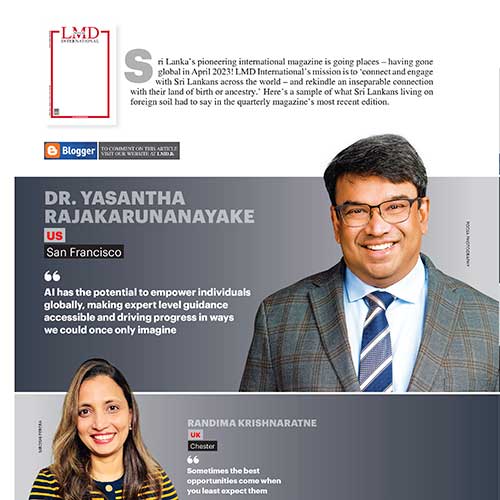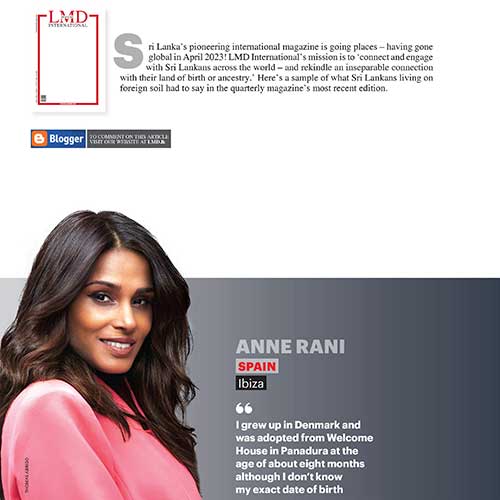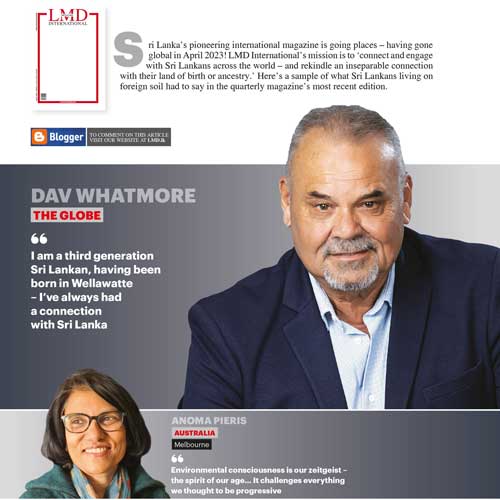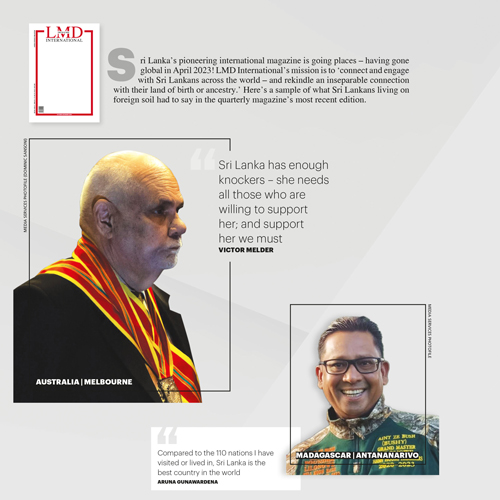SRI LANKANS OVERSEAS
OUR NATIONAL IDENTITY
Upali Obeyesekere seeks to build bridges between communities
Q: As far as perceptions go, do you think Sri Lanka is capable of regaining its composure in the aftermath of the COVID-19 pandemic?
A: Absolutely – Sri Lanka’s universal healthcare system has proven itself. The nation has done remarkably well to contain the spread of the COVID-19 pandemic and these safety protocols must continue to protect human life.
Q: How do you perceive Sri Lanka today?
A: Favourably. Sri Lanka has come a long way since independence.
The nation’s highways and road network have witnessed major expansion, and this augurs well for tourism. Moreover, the economic dynamics have transitioned from that of a predominantly rural based economy towards being more urbanised, focussing on manufacturing and services.
Colombo’s skyline is appealing. The five-star hotels are world-class. Banking is quick and easy.
Q: And how do compatriots in your country of domicile view Sri Lanka?
A: Canadians view Sri Lanka as a multilingual, multiethnic and multicultural country striving to maintain its diversity, and yearning to forge a national identity transcending its differences. They also view an island nation mired in conflict due to 26 years of ethnic strife and the Easter Sunday carnage.
On a more positive note, Sri Lanka is known as an awesome tourist destination and winners of the 1996 ICC Cricket World Cup.
Q: Likewise, how do other Sri Lankans living in Canada view Sri Lanka?
A: The majority view Sri Lanka positively. They love to visit and enjoy the natural beauty of the island nation, while reuniting with friends and family.
Q: What were your impressions of Sri Lanka on your last visit – and how much has it changed from the past?
A: Our last visit was in 2017 and we enjoyed every moment of our 21 day stay.
The infrastructure development and improvements to the road network are remarkable. Hotel accommodation, food, shopping and local travel exceeded our expectations. The Southern Expressway was demonstrative of international standards. Automated banking facilities were seamless – safe and secure. My wife and I brought back many positives.
Q: From afar, how do you perceive news about Sri Lanka and what mediums do you rely on to stay connected especially during times of crisis for example, the Easter Sunday attacks in April 2019 and the coronavirus outbreak this year?
A: News about Sri Lanka is perceived with a ‘pinch of salt.’
I’m super active on social media platforms and engage in interactions with credible sources – both personal and business associates. For general news, I turn to Government of Sri Lanka websites, broadcast media and mainstream print media.
Q: How do you view the brain drain – and why is there still no reversal of it, in your opinion?
A: Brain drain is one of the earliest phenomena associated with globalisation. People have been seeking greener pastures since post-independence.
I view this loss of human capital to have a significant socioeconomic effect at the local level. Sri Lanka will not witness a reversal of this situation until there is reconciliation, rehabilitation and reconstruction of the areas afflicted by the 26 year ‘ethnic conflict.’
Reverse brain drain also depends on the quality of life – a highly subjective measure of happiness.
Q: So what should Sri Lanka focus on most in the coming decade?
A: I believe Sri Lanka’s focus should be on ensuring national security, good governance and financial accountability; tourism – the potential to be a top foreign exchange earner; the manufacturing, agriculture, services and infrastructure sectors; the Port City (Colombo International Financial City or CIFC) development project and increasing foreign direct investment (FDI).
The nation should also build a bridge to restore economic stability in the short run, and lay the groundwork for robust, sustainable and inclusive growth in the medium term.
Q: And finally, what are your hopes for the country in the next decade or so?
A: I hope for nationwide peace and unity among all. It is my hope to see an end to the polarisation between Sri Lanka’s ethnic communities.
Taking the immortal words of former US president John F. Kennedy in context, I hope for an ‘I am Sri Lankan’ identity and for all Sri Lankans to say unequivocally: “Ask not what your country can do for you; ask what you can do for your country.”










